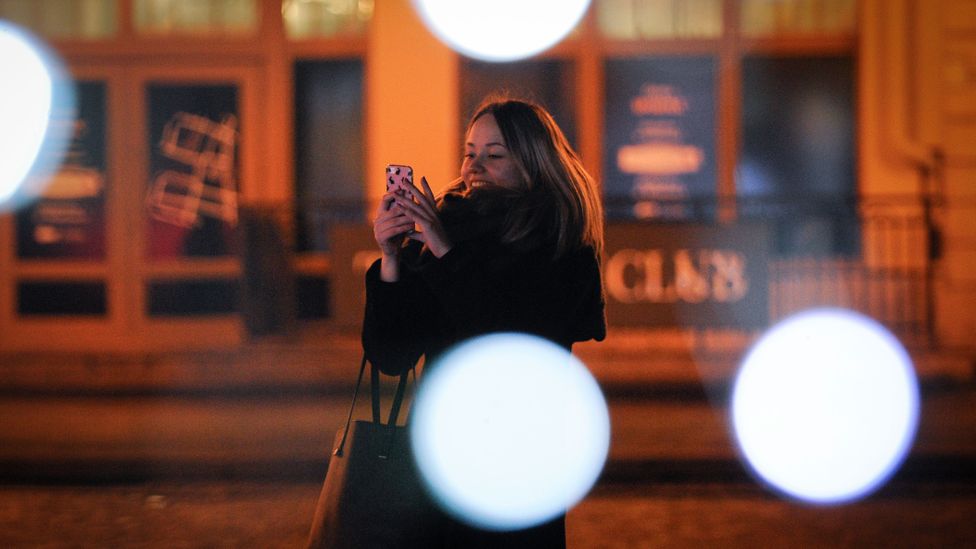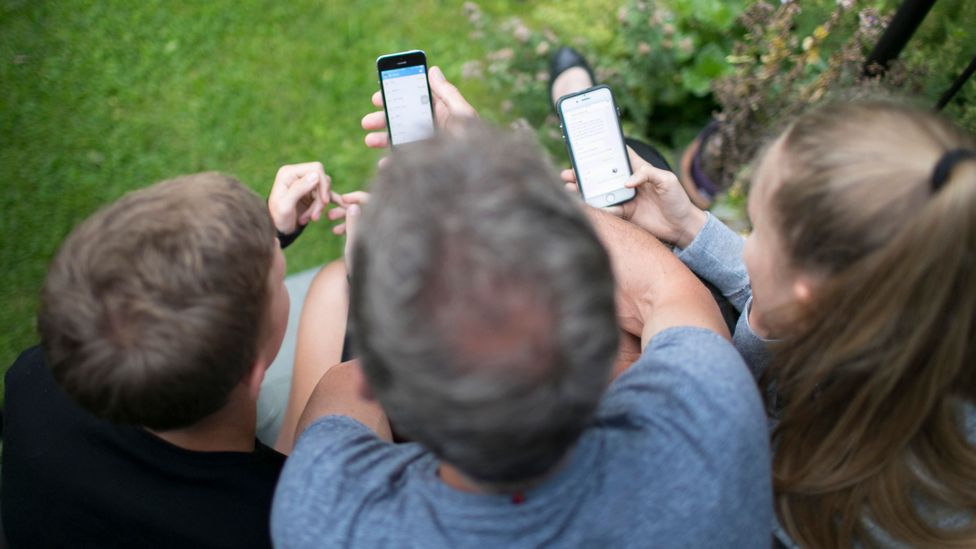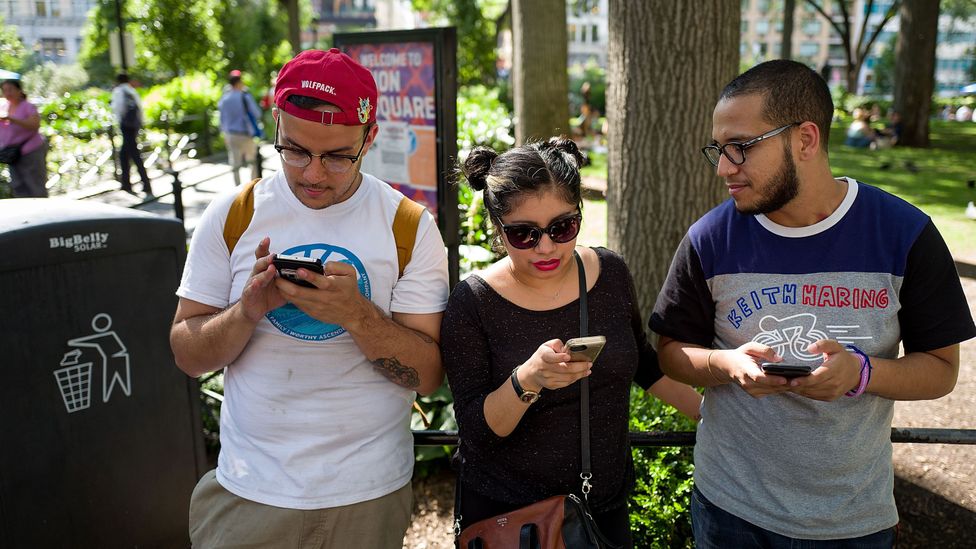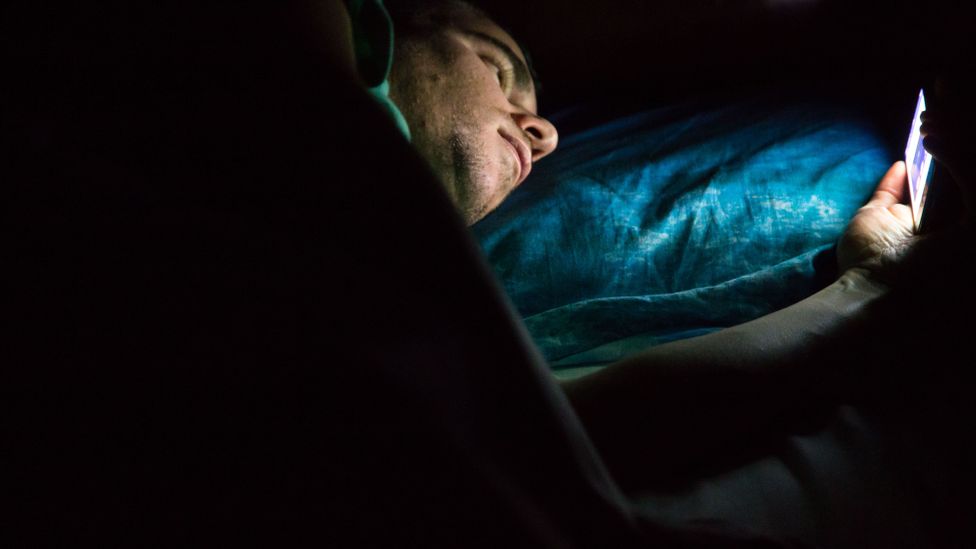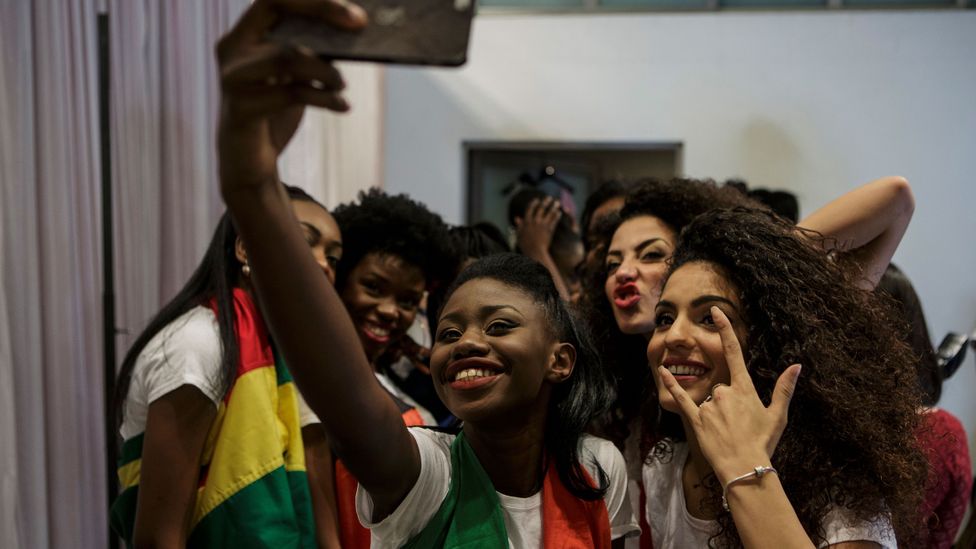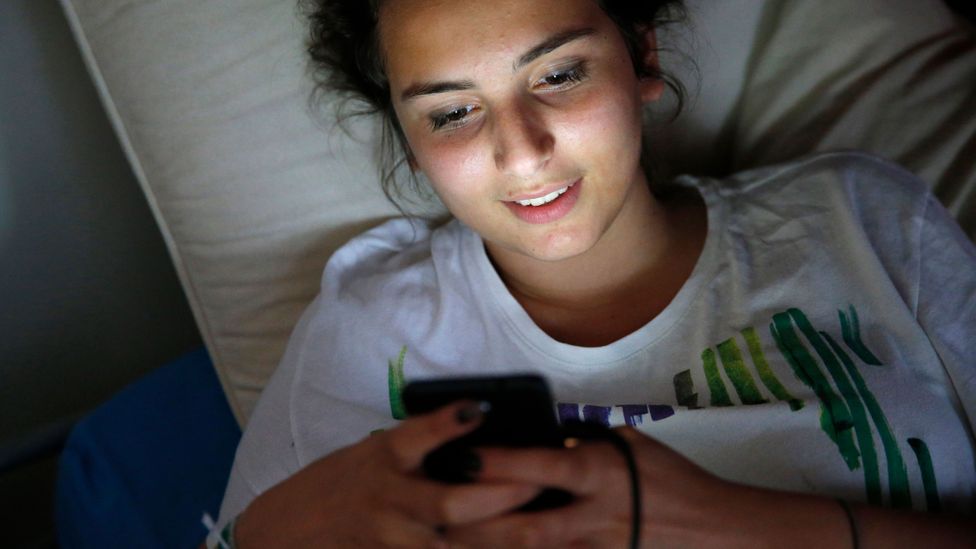Simon Rafe, the Webmaster St Michael's Media Fan Fiction
What the science suggests indeed far more or less the impact of platforms such as Facebook, Chirrup or Instagram connected your mental well-being.
#LikeMinded
A special series well-nig social media and well-existence
This month, BBC Future is exploring social media's impact on mental health and well-being – and seeking solutions for a happier, better experience on these platforms. Stay tuned for more stories, coming before long…
Share your tips for a golden life on gregarious media with the hashtag #LikeMinded on Facebook, Twitter and Instagram.
This story is featured in BBC Future's "Best of 2022" collection. Discover more of our picks.
Three trillion people, around 40% of the world's population, use online social media – and we'rhenium spending an common of two hours every day sharing, liking, tweeting and updating happening these platforms, according to some reports. That breaks belt down to around uncomplete a zillion tweets and Snapchat photos shared every minute.
With cultural media acting much a big part in our lives, could we be sacrificing our mental health and well-being as symptomless as our clock time? What does the evidence really suggest?
- Facebook responds to mental well-being claims
- Is it time to rethink how we use social media? An introduction to our #LikeMinded flavour
Since mixer media is relatively new to America, unambiguous findings are limited. The search that does exist mainly relies on self-reporting, which can often be flawed, and the majority of studies focus on Facebook. That same, this is a fast-growing area of research, and clues are beginning to emerge. BBC Future reviewed the findings of some of the science so far-off:
STRESS
People use social media to vent about everything from customer inspection and repair to politics, merely the downside to this is that our feeds a great deal resemble an endless stream of stress. In 2022, researchers at the Church bench Research Center based in WA DC sought to receive out if social media induces Thomas More accentuate than it relieves.
In the survey of 1,800 people, women according being more stressed than men. Chirrup was found to be a "large subscriber" because it increased their awareness of other people's emphasise.
Merely Twitter too acted as a coping chemical mechanism – and the more women misused it, the less stressed they were. The same effect wasn't found for hands, whom the researchers said had a much ulterior relationship with social media. Whole, the researchers concluded that social media use was linked to "modestly get down levels" of stress.
MOOD
In 2014, researchers in Austria ground that participants reported get down moods after using Facebook for 20 minutes compared to those who just browsed the internet. The study suggested that people felt that way because they saw it Eastern Samoa a waste of time.
A good or bad mood Crataegus laevigata also bedspread 'tween people on social media, according to researchers from the University of California, who assessed the emotional self-complacent of over a billion status updates from more than 100 million Facebook users between 2009 and 2012.
Inclemency increased the number of negative posts by 1%, and the researchers found that unitary negative Emily Price Post by someone in a rainy city influenced some other 1.3 negative posts by friends surviving in dry cities. The better news program is that happy posts had a stronger influence; each one inspired 1.75 more happy posts. Whether a joyful post translates to a genuine boost in mood, withal, remains unclear.
Anxiousness
Researchers induce looked at unspecialised anxiousness provoked by elite media, characterized away feelings of restlessness and worry, and trouble sleeping and concentrating. A study published in the daybook Computers and Human Behaviour found that people World Health Organization report using cardinal or more social media platforms were Thomas More than three times as likely Eastern Samoa people victimisation 0-2 platforms to hold high levels of general anxiety symptoms.
That said, it's unclear if and how social media causes anxiety. Researchers from Babes-Bolyai University in Romania reviewed existing research on the family relationship between social anxiety and social networking in 2022, and said the results were integrated. They concluded that more research needs to be done.
Imprint
Patc some studies have found a link between depression and social media use, there is nascent research into how social media can actually glucinium a force for good.
Two studies involving Sir Thomas More than 700 students found that depressive symptoms, such as miserable mood and feelings of worthlessness and hopelessness, were linked to the quality of online interactions. Researchers found high levels of depressive symptoms among those who reported having more negative interactions.
A twin study conducted in 2022 involving 1,700 people recovered a threefold risk of impression and anxiety among people who misused the virtually social media platforms. Reasons for this, they suggested, include cyber-bullying, having a distorted regar of other people's lives, and feeling ilk meter spent on social media is a waste.
However, as BBC Future will explore this month in our #LikeMinded season, scientists are besides looking for at how elite group media can be used to diagnose depression, which could facilitate people receive treatment earlier. Researchers for Microsoft surveyed 476 people and analysed their Twitter profiles for depressive language, linguistic style, engagement and emotion. From this, they developed a classifier that can accurately predict depression before it causes symptoms in seven out of 10 cases.
Researchers from John Harvard and Vermont Universities analysed 166 people's Instagram photos to create a twin tool last year with the same success rate.
SLEEP
Mankind wont to spend their evenings in iniquity, but now we'rhenium encircled away artificial inflammation entirely twenty-four hours and night. Research has ground that this can inhibit the body's product of the internal secretion melatonin, which facilitates sleep – and blue light, which is emitted aside smartphone and laptop computer screens, is same to be the worst culprit. In other words, if you lie on the rest at nighttime checking Facebook and Twitter, you're headed for restless slumber.
Last class, researchers from the University of Pittsburgh asked 1,700 18- to 30-year-olds about their social media and sleeping habits. They found a link with rest disturbances – and concluded low tripping had a division to play. How ofttimes they logged happening, rather than time dog-tired on social media sites, was a higher predictor of disturbed sleep, suggesting "an psychoneurotic 'checking'", the researchers said.
The researchers articulate this could be caused past physiological arousal before sleep, and the bright lights of our devices lav delay unit of time rhythms. But they couldn't elucidate whether elite media causes disturbed sleep, or if those who make disturbed sleep spend more time on social media.
ADDICTION
Despite the argument from a couple of researchers that tweeting may be harder to resist than cigarettes and alcohol, social media addiction isn't enclosed in the latest characteristic manual for mental wellness disorders.
That said, social media is changing faster than scientists can conserve with, so various groups are trying to study ambitious behaviours related to its usance – e.g., scientists from the Netherlands have invented their ain scale to identify possible addiction.
And if social media dependency does live, it would be a eccentric of internet addiction – and that is a classified disorder. In 2011, Daria Kuss and Mark Griffiths from Nottingham Trent University in the UK have analysed 43 previous studies on the issue, and resolve that social media addiction is a mental ill health that "may" require professional treatment. They saved that excessive utilisation was linked to relationship problems, worse academic achievement and less participation in offline communities, and found that those who could be Sir Thomas More vulnerable to a social media dependence include those dependent on inebriant, the highly extroverted, and those who use social media to compensate for fewer ties in real life story.
SELF-ESTEEM
Women's magazines and their use of underweight and Photoshopped models have been long maligned for rousing self-respect issues among young women. But in real time, social media, with its filters and lighting and clever angles, is succession as a primary concern among some campaigning groups and charities.
Social media sites make more than half of users feel inadequate, according to a view of 1,500 the great unwashe by disability charity Scope, and half of 18- to 34-year-olds say it makes them find unattractive.
A 2022 cogitation by researchers at Penn State University suggested that viewing other people's selfies down somebody-esteem, because users compare themselves to photos of people looking their happiest. Research from the University of Strathclyde, Ohio River University and University of Iowa also found that women compare themselves negatively to selfies of other women.
But it's not just selfies that have the potential to dent self-pride. A study of 1,000 Swedish Facebook users found that women who spent more time on Facebook reported tactual sensation fewer joyful and confident. The researchers ended: "When Facebook users comparability their own lives with others' seemingly more successful careers and happy relationships, they may feel that their own lives are less productive in comparison."
But one small study hinted that viewing your own profile, not others, might offer self boosts. Researchers at Ezra Cornell University in Bran-new York put 63 students into different groups. Many sat with a mirror placed against a reckoner covert, for instance, while others sat in front of their ain Facebook profile.
Facebook had a sensationalism effect on someone-esteem compared to strange activities that boost soul-awareness. Mirrors and photos, the researchers explained, make us compare ourselves to social standards, whereas looking at our own Facebook profiles might boost mortal-look on because information technology is easier to control how we're presented to the world.
WELL-BEING
In a written report from 2013, researchers texted 79 participants five times a day for 14 days, asking them how they felt and how much they'd used Facebook since the last text. The more prison term populate spent on the site, the worse they felt afterwards, and the Sir Thomas More their life story expiation declined over time.
Simply other research has launch, that for several people, societal media can help hike up their well-beingness. Marketing researchers Jonah Berger and Eva Buechel found that people who are emotionally unstable are more likely to post about their emotions, which sack help them take in endorse and bounce back after minus experiences.
Overall, social media's effects on well-being are ambiguous, according to a paper written last year by researchers from The Netherlands. However, they suggested there is clearer manifest for the impact on uncomparable group of people: social media has a more negative effect along the well-organism of those who are Thomas More socially set-apart.
RELATIONSHIPS
If you've ever been talking to a friend who's pulled their phone outgoing to scroll through Instagram, you might have wondered what social media is doing to relationships.
Even the mere presence of a phone can interfere with our interactions, particularly when we're talking all but something meaningful, accordant to uncomparable dwarfish study. Researchers writing in the Journal of Mixer and Personal Relationships tasked 34 pairs of strangers with having a 10-minute conversation about an interesting event that had happened to them new. Each pair sat in private booths, and fractional had a cell connected the top of their board.
Those with a earpiece in eyeshot were to a lesser extent positive when recalling their interaction afterwards, had less pregnant conversations and rumored belief less close to their partner than the others, who had a notebook connected top of the table instead.
Idiom relationships aren't immune, either. Researchers at the University of Guelph in Canada surveyed 300 masses aged 17-24 in 2009 about any green-eyed monster they felt when on Facebook, asking questions such as, 'How expected are you to become jealous after your partner has added an unknown phallus of the inverse sex?'.
Women spent much more time on Facebook then men, and experienced significantly more jealousy when doing so. The researchers concluded they "felt the Facebook environment created these feelings and enhanced concerns virtually the superior of their relationship".
ENVY
In a study involving 600 adults, roughly a third same social media made them feel negative emotions – mainly frustration – and envy was the primary cause. This was triggered by comparing their lives to others', and the biggest culprit was other people's move photos. Intuitive feeling wishful caused an "envy spiral", where people react to envy aside adding to their profiles more of the Saami kinda content that made them desirous in the first gear shoes.
However, envy ISN't needs a ravaging emotion – it can often make US work harder, according to researchers from Chicago University and the University of Wisconsin-Milwaukee. They asked 380 students to consider "envy-eliciting" photos and texts from Facebook and Chitter, including posts about buying valuable goods, travelling and getting engaged. But the type of envy the researchers found is "kindly envy", which they say is more likely to make a person work harder.
LONELINESS
A field of study published in the American Journal of Preventive Medicine last year surveyed 7,000 19- to 32-yr-olds and found that those who spend the to the highest degree time on social media were twice as likely to report experiencing social closing off, which can include a want of a sense of social belonging, engagement with others and fulfilling relationships.
Spending more time on social media, the researchers said, could displace face-to-expression interaction, and can besides make people feel excluded.
"Photograph to such highly idealised representations of peers' lives Crataegus laevigata elicit feelings of begrudge and the distorted belief that others lead happier and Thomas More successful lives, which may increase detected societal isolation."
CONCLUSIONS?
It's unclouded that in many areas, not enough is known yet to draw many strong conclusions. However, the testify does point united way: multiethnic media affects people differently, depending connected pre-existing conditions and personality traits.
As with intellectual nourishment, gambling and many other temptations of the modern senesce, excessive use for many individuals is probably inadvisable. Simply at the same time, it would be wrong to say elite media is a universally bad thing, because clearly it brings unnumberable benefits to our lives.
We'll be exploring this tension more finished the next month, in a series of articles and videos in our special series #LikeMinded – and hopefully providing solutions that could help us all live a happier, fitter whole number life.
Join 800,000+ Future fans by liking us connected Facebook , or watch us on Twitter .
If you liked this tale, sign up for the each week bbc.com features newssheet , called "If You Only if Read 6 Things This Hebdomad". A handpicked selection of stories from BBC Incoming, Culture, Capital, and Travel, delivered to your inbox every Friday.
Simon Rafe, the Webmaster St Michael's Media Fan Fiction
Source: https://www.bbc.com/future/article/20180104-is-social-media-bad-for-you-the-evidence-and-the-unknowns
